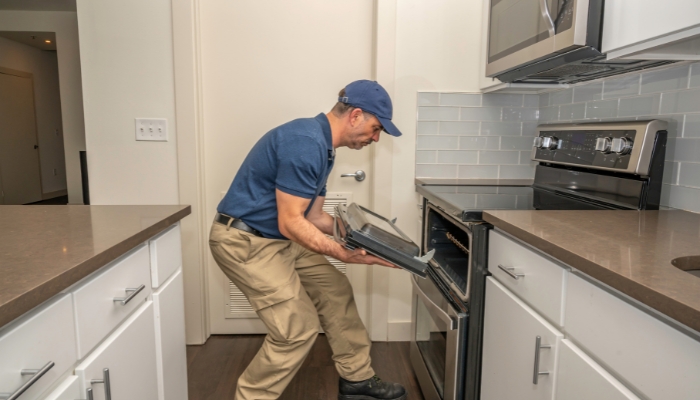Your stove is like the superhero of your kitchen, always ready to help whip up meals. But even superheroes face challenges. Sometimes, stoves have issues that are a bit tricky to solve. While some problems might be a quick DIY fix, others are more complex and need an expert touch.
But which ones require professional assistance? We'll show you!
1. Faulty Igniters: Click But No Flame

Turning on your gas stove usually results in a satisfying click followed by a blue flame. But what if you only hear the click and see no flame? Or worse, hear nothing at all? This could be a sign of a faulty igniter.
Igniters can wear out over time or get clogged with food spills. Sometimes, cleaning it out might do the trick. However, if the issue persists, it's a clear sign you need professional help. Replacing an igniter isn't straightforward; it requires expertise to ensure safety and functionality. So, it's always best to call in the pros when in doubt.
2. Broken Oven Door

The oven door might seem like just another part of your range, but it is crucial in ensuring your food cooks evenly. If your oven door doesn't close properly or has a broken seal, it can lead to heat escaping, resulting in uneven cooking or baking. Plus, it's a safety hazard, especially if you have curious little ones around.
Issues like damaged hinges or worn-out gaskets might tempt you into a DIY fix. But here's the thing: oven door repairs can be tricky. Getting it wrong could mean more problems down the line. So, when in doubt, it's always best to ring up a pro (like our team!) to set things straight.
3. Malfunctioning Thermostat Sensor
Your oven's thermostat sensor is like its internal thermometer. It's responsible for gauging the oven's temperature and signaling the control board to adjust the heat accordingly. When this little gadget goes haywire, you might find your oven either undercooking or overcooking your meals, a recipe for frustration.
Common signs of a faulty thermostat sensor include the oven not reaching the set temperature or temperature fluctuations during cooking. While recalibrating the oven might help in some cases, persistent issues often indicate a sensor on its way out. And replacing it? That's a job best left to the experts to ensure accuracy and safety.
4. Gas Leaks: A Silent Culprit
Gas leaks can be sneaky but are a significant concern in any kitchen. Common signs include a distinct sulfur-like smell (often described as rotten eggs), a hissing sound near the range, or even a yellowish flame instead of a blue one. If you notice any of these:
- Immediately turn off the stove.
- Avoid using open flames or electrical appliances.
- Open windows to ventilate the area.
- Evacuate your home and call the gas company or a professional technician from a safe distance (for more severe gas leaks, call emergency services).
It's crucial not to try fixing this on your own. Always prioritize safety and call in professionals, like our team, to handle the situation.
5. Malfunctioning Control Board: Your Range's Command Center

The control board is like the brain of your stove, directing every function. When it's not working right, your cooking can go haywire. Some telltale signs include improper oven heating, unresponsive buttons, or a faulty timer.
While it might seem like a simple fix, the control board is a complex piece of tech. Mistakes can lead to bigger issues or safety risks. If you spot any problems, it's best to let a professional handle it. They'll determine if it needs a repair or a complete replacement.
Bonus: Wiring and Electrical Issues: Let's Talk Safety
Behind every perfectly roasted chicken or that delicious casserole is your range's intricate wiring and electrical system doing its magic. But when things go awry, like inconsistent heating or a display acting up, it's probably because the wires and circuits are acting out. However, should you dive into the electrical maze yourself? Absolutely not!
It's not just about the appliance; it's about your safety. One wrong move can lead to sparks or even a fire. So, if your range is giving you electrical vibes (and not the good kind), call our experts. We're here to help safely and efficiently.
Troubleshooting Common Range Issues
Every appliance has its quirks, and ranges are no different. Before hitting the panic button, here are some quick fixes you can try:
- No Power? First, ensure the range is plugged in and the circuit breaker hasn't tripped. Sometimes, it's as simple as flipping a switch.
- Gas Range Not Igniting? Check if other gas appliances in your home are working. If not, you might have a gas supply issue.
- Uneven Cooking? Rotate your food or adjust the oven racks. Sometimes, it's just about finding that sweet spot in the oven.
- Strange Noises? Ranges can make odd sounds as they heat and cool. However, loud bangs or hissing might indicate a bigger problem.
When in doubt, you should always consult the user manual for troubleshooting tips. But if the fixes don't do the trick or the problem is bigger than expected, then that's when professional service teams (like ours!) come in!
Cooking Up Safety & Efficiency

Your range is the heart of your kitchen, ensuring every meal is a masterpiece. But like any star, it needs the right care to shine. So, when things get too hot to handle (metaphorically speaking!), remember our service team at Dick Van Dyke Appliance World is here to help.
Whether it's a minor hiccup or a major malfunction, we have the expertise to get your range back in top shape. So, don't hesitate — give us a call or swing by, and let's keep your kitchen cooking smoothly!